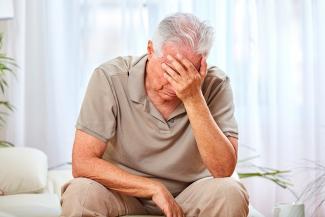
About one in five of suicides are of senior citizens. It is a cause for enormous concern that warrants attention from healthcare providers, policy makers, communities and us as part of the larger society, writes Samiksha Sivan.
In an effort to raise awareness about suicides and suicide prevention, and destigmatize it, we observe September 10 as World Suicide Prevention Day, a concept organised by the International Association of Suicide Prevention (IASP) and the World Health Organization (WHO). Even though this concept has good reach across the world, there is one aspect of suicide that many of us remain unaware of - Geriatric suicide or suicide in older adults.
हिंदी में पढ़ें: वृद्धावस्था में आत्महत्या के कारण और रोक-थाम
With teenage/adult suicides contributing to the bulk of media involvement, majority of us tend to associate suicide with the 18-50 age groups. But, according a study in the Indian Journal of Psychiatry about 1 out of 5 people in India who die by suicide are aged 65 and above. Even with such a high rate of elder suicides in our country, how many of us actually hear/know about this unfortunately common tragedy? This is because most of these suicides are unreported and therefore, ‘silent’.
In light of the need to break this silence, we need to first understand why elder suicides occur, the criticality of early detection of mental health issues and, most importantly, how can we, as individuals of modern day society, help in alleviating a public health concern which is like a silent disease.
Why should we address geriatric suicides?
- The United Nations classifies India as an ‘ageing country’ with 8.6% of the total population being above 60 years of age in 2011. This number is expected to triple by 2050, thereby constituting 20% of the population.
- With the increase in a vulnerable population, early detection with the help of family and mental healthcare professionals by identifying high-risk candidates, and by increasing our empathy towards older adults, we as a community can help prevent geriatric suicides.
- Suicide is a major public health concern involving all levels of society. Therefore, late life suicide is a cause for enormous concern that warrants attention from healthcare providers, policy makers, communities and us as part of the larger society.
What makes older adults vulnerable?
With declining physical health, adapting to the changes in the body, the loss of strength and agility, vision/hearing problems, lifestyle diseases, neurological problems, dealing with losses of spouse, friends, colleagues etc. become extremely debilitating for those with low social and emotional support. With all this begins the process of feeling lonely, helpless, dependent, and if these aren’t addressed, depression and/or anxiety.
Why is an older person more prone to mental health issues?
Social Exclusion: Social exclusion is one of the most common problems faced by the elderly. They may seldom be invited to social events due to various reasons ranging from loss of hearing, physical dependence on others, difficulty traveling to the location or lack of empathy and support from the family.
Loneliness: This is an inevitable by-product of social exclusion. It may also happen that many of your loved one’s friends can no longer spend time together due to their own health problems. For many, ageing is an adversity, a difficult phase of life in which they need social and emotional support from family and friends.
Perceived Burden: The perception of oneself being a burden on their family. This is a theme which is commonly seen by clinicians in individuals who are perceived to be at high risk. This theme can be detected in recurring statements like ‘being a pain’, or ‘causing too much trouble’ or ‘I feel bad that you have to do so much for me.’
Bereavement: At this stage of life, facing a multitude of losses in some form or the other is unavoidable, losing their partner, friends, colleagues, or pets. Spousal bereavement is a life-altering and devastating event which may take a long time to overcome. At some point, everyone they knew from their past or from the ‘old days’ are no more.
Depression: This is a common problem associated with the elderly. In India, a study found that about 34.4% of the older adult population with a majority being women suffer from depression. The above mentioned risk-factors can also equally contribute to the condition as well as other serious issues like elder abuse and neglect.
Elder Abuse and Neglect: Elder abuse is more common that you may think; 1 in 6 older people have faced neglect or abuse from their communities. (WHO). It constitutes physical, sexual, psychological, emotional abuse, financial /material abuse, abandonment, and neglect. It goes without saying how much this can affect an individual’s mental health.
Covid-19 Pandemic: As the world copes with the ‘new normal’, we are looking into an unpredictable future. Naturally, such a situation causes anxiety. The pandemic places the elderly in a more vulnerable situation than they already are in, as a high-risk population for Covid-19. Moreover, this may be contributing to loneliness, anxiety, disruption of daily activities, and the fear of contracting an unknown illness.
Importance of early detection
Early detection is the key to prevent suicides. Simply because, the earlier you detect a mental health issue, the lesser the individual suffers its consequences. Regular communication, empathising, being patient and being alert to changes in behavioural/daily activities is the key to early detection.
The following are some red flags which will help you understand when it is time to notify your doctor and seek help:
- The length and intensity of feelings seem to be increasing.
- Presence of low mood and a loss of interest in hobbies or things which they liked to do.
- Changes in daily routines like eating or sleeping less/more.
- Isolating oneself from family/friends
- Recurring statements such as ‘I am being a burden to you’, or ‘I’d be better off dead’
- Experiencing feelings of helplessness or hopelessness.
Importance of early intervention
Early intervention is one of the key strategies to treat mental health concerns, prevent suicides and ensure optimal well-being for older adults. Remember, the earlier you take action, the better the chance of prevention. If you do come across your loved one showing any of the above signs, make sure you either speak to a mental healthcare professional directly, or contact your doctor, who can refer you to one immediately.
While this may seem overwhelming, especially with virtual communication, you may notice that when you give them a patient and listening ear, they may willingly tell you about their concerns. Spending time with them, being there for them when they need you, and letting them know that you care for them can help them cope in these unprecedented times.

Samiksha Sivan is a psychologist specialising in geriatric mental health, with work experience in rehabilitation of Parkinson’s Disease, Alzheimer’s disease and Stroke.
References:
https://www.aamft.org/AAMFT/Consumer_Updates/Suicide_in_the_Elderly.asp…;- American Association of Marriage and Family Therapy
https://www.psychologytoday.com/us/blog/understanding-grief/202001/why-…;- Article in Psychology Today
https://www.ncbi.nlm.nih.gov/pmc/articles/PMC3107573/ - NCBI study on geriatric suicides
https://www.ncbi.nlm.nih.gov/pmc/articles/PMC5916258/ - Current perspectives on elder suicides study
https://www.todaysgeriatricmedicine.com/news/exclusive_03.shtml - article in Today’s Geriatric Medicine
https://pubmed.ncbi.nlm.nih.gov/1935195/ - study done on elderly suicides in India
https://www.emerald.com/insight/content/doi/10.1108/WWOP-11-2017-0031/f…;- recent study on elder suicide in India
https://www.jgmh.org/article.asp?issn=2348-9995;year=2019;volume=6;issu…;- study from Journal of Geriatric Mental Health






